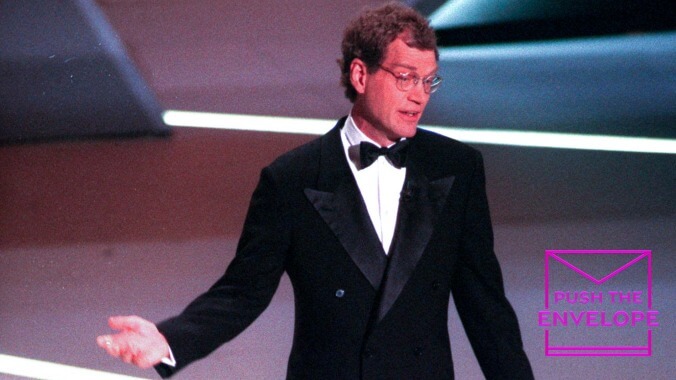Let's revisit the "explosion of excrement" that was David Letterman hosting the 1995 Oscars

Uma, Oprah, oh no.
David Letterman was a late-night juggernaut when he was asked to host the 1995 Academy Awards. The former Late Night host was a ratings success with his two-year old Late Show at CBS routinely besting Jay Leno, who had taken the gig many (including Letterman) thought he would gotten after Johnny Carson retired in 1992. Still, Letterman was nervous. “I started to get scared realizing, ‘Maybe I don’t belong here,’” he told The Hollywood Reporter earlier this year of preparing for the gig, a night he described as an “explosion of excrement.”
Letterman’s performance is most remembered for the moment he “introduced” Oprah Winfrey to Uma Thurman (and Keanu Reeves). The bit that fell flat on arrival, but the host continued to call back the bit throughout the evening—a decision Letterman doesn’t recall making in the moment. “Well, see, now this is interesting, because I had forgotten the subsequent references. Did I do it continually?” he asked THR’s Scott Fienberg. “I was trying to save myself. ‘If you have an extra life raft, throw one to me!’ That’s what I was trying for. But I had forgotten that—I thought it was just one and out. It must have been pure survival instinct.”
Letterman may not remember the details of the evening, but The A.V. Club’s managing editor Erik Adams certainly does—and he joins editor-in-chief Patrick Gomez on today’s episode of The A.V. Club’s podcast Push The Envelope to discuss the entire performance. “I don’t think I had enough of a context to understand what was successful and what was unsuccessful in terms of the Oscars stage,” Adams says of being 10 when the ceremony aired. “I thought it was hilarious.”
Above, you can listen to the whole episode of Push The Envelope, which includes a discussion about how the ’95 Oscars pitted Baby Boomers against Gen X, as well as an interview with Tom Green. And here’s a brief excerpt of the Letterman conversation.
ERIK ADAMS: It doesn’t help that the joke wasn’t something that was written far in advance. That was something that his longtime producer, Rob Burnett, just kind of pitched when they were almost going to air. And for a production of this scale, there’s a certain amount of planning and preparation that has to go into it—and it is absolutely devastating to any element of improvization that a performer wants to introduce into it.
 Keep scrolling for more great stories.
Keep scrolling for more great stories.
